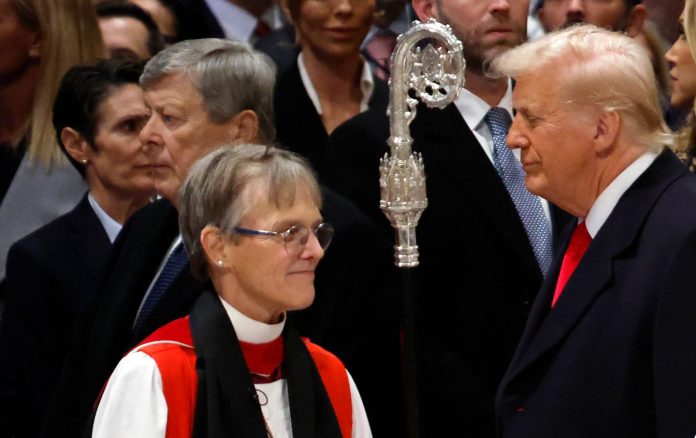Politics
/
January 23, 2025
The president may not have approved of Mariann Edgar Budde’s homily at the National Cathedral. But the bishop answered to a higher moral calling.
Bishop Mariann Edgar Budde arrives as US President Donald Trump looks on during the National Prayer Service at Washington National Cathedral on January 21, 2025.
(Chip Somodevilla / Getty Images)
Bishop Mariann Edgar Budde, who stirred the wrath of Donald Trump and his conservative allies this week with a National Prayer Service homily that urged the newly inaugurated president “to have mercy upon the people in our country who are scared now,” speaks a reflective and compassionate language of faith. In a hopeful embrace of the vast requirements of the biblical commandment to love thy neighbor as thyself, she encourages Americans in the nation’s capital city—especially those with power—to more deeply consider the intersection of their stated beliefs and their actions.
Yet, while her prodding in this regard is invariably rich with nuance and an impulse toward forgiveness, the spiritual leader of the historic Episcopal Diocese of Washington does not hesitate to speak necessary truths in difficult times.
Two years into Trump’s first presidential term, Bishop Budde joined other leaders of Washington’s National Cathedral in criticizing the “escalation of racialized rhetoric from the President of the United States.” In a stark statement, the leaders warned, “When such violent dehumanizing words come from the President of the United States, they are a clarion call and give cover to white supremacists.”
In June of 2020, when authorities cleared the way through a Black Lives Matter demonstration so that Trump—a sharp critic of the protests that erupted following the murder of George Floyd Jr. by a Minneapolis police officer—could hold a Bible aloft outside the parish house of St. John’s Episcopal Church on Lafayette Square near the White House, Budde issued a statement on behalf of the diocese, which said, “In no way do we support the President’s incendiary response to a wounded, grieving nation. In faithfulness to our Savior who lived…
Current Issue

….
Popular
“swipe left below to view more authors”Swipe →
Bishop Budde offered a similar reflection on her choice to make a call for mercy in her homily. Asked Wednesday if she thought her message was being “misconstrued and politicized,” she replied, “How could it not be politicized, right? We’re in a hyper-political climate.”
But then the bishop explained, “One of the things I caution about is the culture of contempt in which we live that immediately rushes to the worst possible interpretations of what people are saying and to put them in categories—such as the ones you just described. That’s part of the air we breathe now. And I was trying to speak a truth that I felt needed to be said, but to do it in as respectful and kind a way as I could, and also to bring other voices into the conversation, voices that had not been heard in the public space for some time.”




